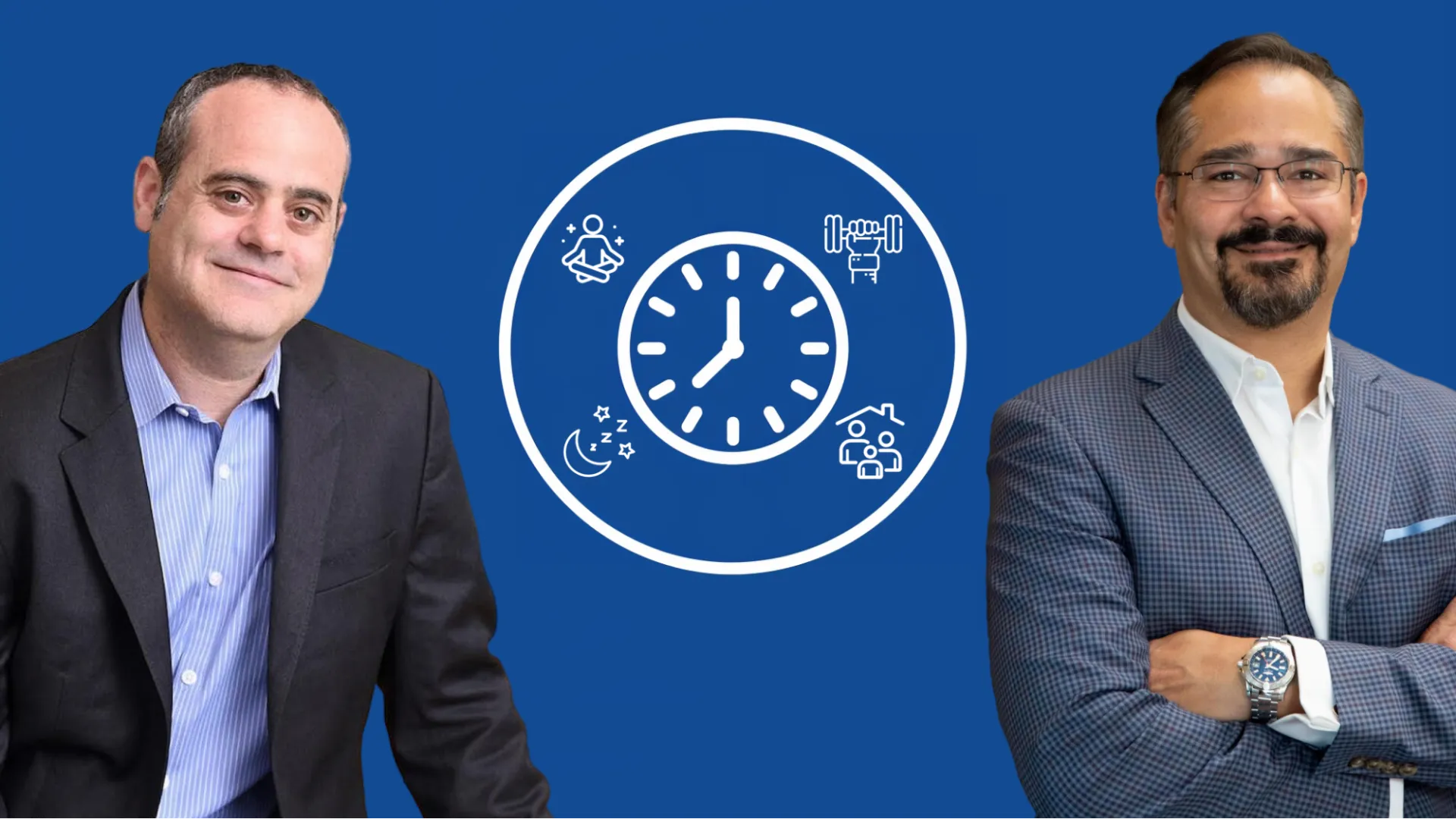
Building a startup makes it tough to find time for the rest of your life, especially personal health and relationships. But you can't maintain peak performance without nutritious habits and emotional support. It's crucial to cultivate habits that support your mental well-being, physical stamina, and overall effectiveness as a leader.
Two accomplished security startup founders, Nir Polak of Exabeam and Snehal Antani of Horizon3.ai, and former CTO of the U.S. Joint Special Operations Command, recently shared their hard-earned wisdom on how to scale yourself as you scale your company.
Key takeaways:
- Protect your personal time and health fiercely, as you'll only get busier.
- Build a sustainable work environment by setting cultural norms and prizing accountability.
- Delegate more as you evolve from hands-on problem solver to strategic team leader.
As Polak and Antani emphasized, it's not just about setting goals but creating systems and routines you can stick with to evolve from a “zero to one” founder to a “one to N” CEO.

Mastering the work/life balancing act
Startup founders face immense pressure that intensifies as their companies scale. “Stress only goes up. It doesn't go down as the company grows,” warns Polak. “If you're stressed now, you're gonna be double, triple, quadruple stressed as your company grows.”* This escalating stress can have ripple effects throughout your organization—and your personal life. Antani cites that there are “high depression rates and high divorce rates, especially for older founders with families.”*
A founder's stress often manifests in terse Slack messages or other negative interactions with the team, potentially undermining morale and productivity. Managing your stress isn't just about personal well-being: it's crucial for maintaining a healthy company culture.
Morning rituals can set the right tone for the day, and both founders stressed the importance of protecting personal time before diving into work. Polak admitted, “In the early stages of the startup, you want to be in full control. The first thing I did [in the morning] was read emails before I did anything else—a very bad mistake.” He later adjusted his routine: “I wouldn't touch my phone or come near my phone until I woke up, had coffee, spent an hour with the kids, and only then went into work mode.”
Antani takes a more hardline approach. “No snacking, no alarm clocks, no booze.” By eliminating anything that impeded his performance and by listening to his body about how much sleep he needed, he could always be the most prepared person in the room. “I sleep until my body doesn't need to. That could be three hours, that could be nine hours, I don't care. What I found was that it was a huge unlock for mental focus.”

Balancing family life with the demands of a growing startup is an ongoing challenge. Antani shared a poignant insight: “Just because I'm physically present doesn't mean I'm mentally present.” He found that clearly delineating work and family time was essential for maintaining relationships and managing stress. “The biggest contributor of stress in my life wasn't work. It was that the fires due to work upset my family,” Antani reflected.
Practical steps the founders recommend include:
- Prioritizing adequate sleep and exercise
- Avoiding work emails first thing in the morning
- Scheduling nonnegotiable family and personal time in your calendar
- Establishing clear boundaries between work and personal life so your brain can shut off
The book Atomic Habits by James Clear is a concise guide to crafting your behavior. Instead of focusing on the end results, work on building repeatable systems and “habit stacking,” where you link new habits you want to form with ones you're already doing consistently. For example, if you want to get more exercise, add some push-up sets or a quick run into your existing coffee and shower routine.
As companies scale, founders must also evolve how they manage stress. Polak candidly shares his experience: “We grew very quickly, and what happened to me is that I did not have the right systems that I have now—I did not take good enough care of me.” He now sees a therapist specializing in CEOs and founders, which is increasingly common and highly effective.
Building a self-reinforcing company culture
A startup's culture is defined early and reinforced constantly. “You need to indoctrinate anyone who is stepping into your company,” advises Polak. “Interview people for culture. Ensure it's embedded in the new-hire process.”
Polak stresses the importance of publicly addressing behaviors that violate company values. He shared a personal example: When there was an email chain or something that wasn't according to our values, he would show the entire team as an example of how not to behave. This approach, while seemingly harsh, is crucial for maintaining a strong culture. By clearly stating, "These behaviors do not correspond to our values and are not accepted here,” Polak ensured everyone understood the consequences of disregarding company values. This method, though potentially uncomfortable, reinforces that culture is not just a set of words but a vital aspect of the company that requires active protection and nurturing.
As you scale, implement systems to reinforce cultural values:
- Empower employees to hold each other accountable to cultural standards.
- Hire “learn-it-alls” over “know-it-alls,” and people who can work well under pressure.
- Build rapport with employees across all levels of the organization to increase their morale and your visibility into operations.
Antani recommended creating “a performance culture of demanding excellence from yourself and others.” This self-regulation across the company will reduce stress on founders and executives by relieving them from being the sole torch-bearers.
Empowering autonomous leaders to fight fires
In the earliest stages, founders must be hands-on and willing to do any task. But as you grow, your approach must change dramatically. Polak describes this as “the founder dilemma”:
“I was able to do probably everything better than anyone else because I knew it already. I know the product, strategy, messaging, and tech. People come to you with problems, and my instinct was to help them—but help them by solving it. And then you become the bottleneck, and that was very bad.”
Antani sums it up: Just because you can solve a problem doesn't mean you should solve a problem. To save time for what only you can do, hire autonomous leaders and train them instead of doing work for them. As you grow, they can shield you from smaller operational issues, reducing your personal stress.
Instead of fighting everyone's fires, “I'm in the alignment business,” says Antani. “I need to ensure alignment exists between product and marketing, or finance and revenue ops. I need to make sure that every calorie expended on a line of code is expended on code that's going to maximize impact.”
He continues, “And then the next part is accountability through cadence, because it's one thing to draw alignment on a whiteboard or on a PowerPoint slide, but it's the cadence that is going to drive accountability across the team.”
Nir and Snehal shared these insights as part of SignalFire’s Founder Performance Mastery Series, a 12-part program of virtual sessions for our portfolio company founders and CEOs on how to maximize their potential. Other sessions in this program feature experts on improving nutrition, dealing with burnout, and becoming a growth leader. SignalFire also provides Mastery Series programs around finance, marketing, sales, people, and more. This scalable offering helps teams level up as their companies grow.
To put these insights into practice, SignalFire portfolio companies also get access to our Beacon AI data platform for recruiting and sales, as well as our in-house experts like former Netflix Chief Talent Officer Tawni Cranz, an operating partner at Signalfire, for strategic company building, leadership and CEO advisory, and best-in-class ways of building high-performing cultures; former Stripe CMO Jim Stoneham, an operating partner at SignalFire, for go-to-market and growth engine advisory advisory; and former TechCrunch editor-at-large Josh Constine for PR and storytelling. Check out more tips from SignalFire’s Mastery Series.
Redefining your worth as a founder
Ultimately, founders must shift their mindset away from total ownership of every detail. Polak has tried to become less emotionally wrapped up in his companies now. “It's an asset. It doesn't define me.” While taking everything personally can be motivating, it's rarely sustainable.
Scaling a startup demands continuous personal growth, not just revenue growth. By building disciplined habits, hiring teams with high standards, and delegating more, founders can navigate the transition from startup visionary to effective CEO without giving up everything else.
Antani concludes with a valuable perspective: for most startup problems, “No one's going to die,” so you need to ask yourself, “Hey, is this really work stress? Or is it just a demand of ourselves as founders to do more?”
* Portfolio company founders have not received any direct compensation for this feedback. These founders may or may not serve as Affiliate Advisors, Retained Advisors, or consultants to provide their expertise on a formal or ad hoc basis. They are not employed by SignalFire and do not provide investment advisory services to clients on behalf of SignalFire. They may or may not have made a personal investment into a SignalFire fund.
*Portfolio company founders listed above have not received any compensation for this feedback and may or may not have invested in a SignalFire fund. These founders may or may not serve as Affiliate Advisors, Retained Advisors, or consultants to provide their expertise on a formal or ad hoc basis. They are not employed by SignalFire and do not provide investment advisory services to clients on behalf of SignalFire. Please refer to our disclosures page for additional disclosures.
Related posts






